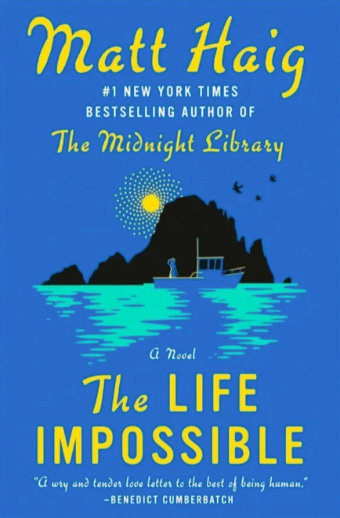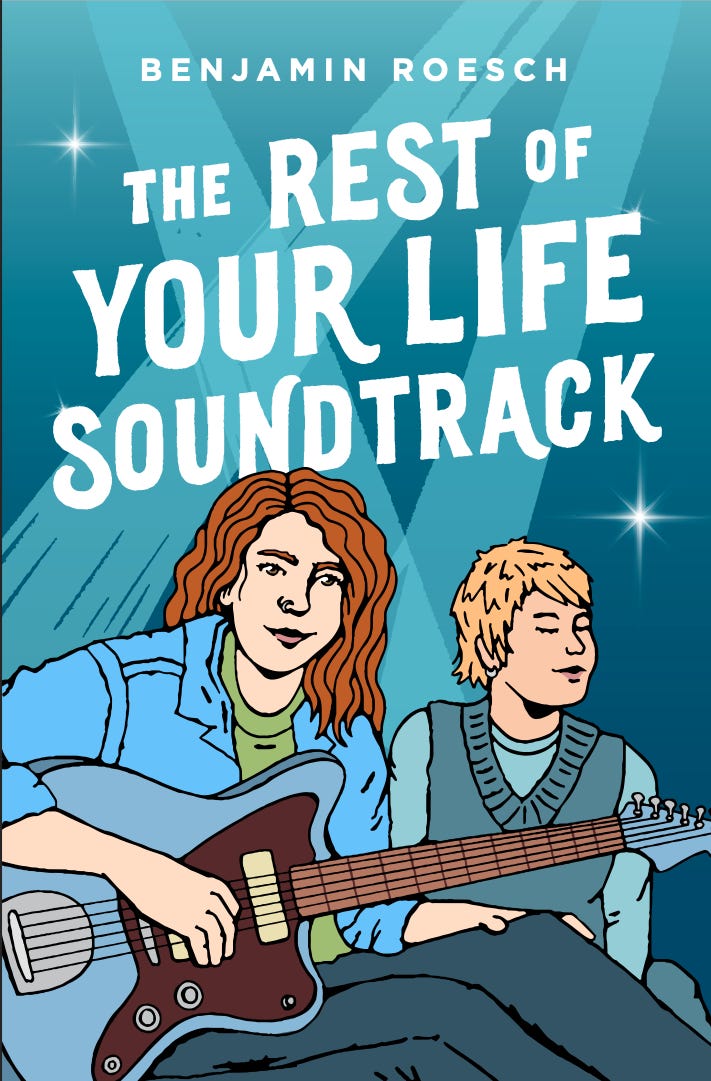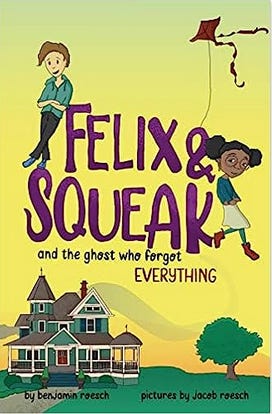SPOILER ALERT! This post gives everything away, so you might want to finish the book before reading!
______________________
Imagine you’re at the grocery store and you’re shopping for dinner. You don’t have a meal in mind, but you are really hungry, so you start grabbing things that look delicious and throwing them into your basket.
Dinner is going to slay!
When you get home, you unpack all the delicious wares you procured for your dream meal:
A grass-fed ribeye steak
Swiss cheese
Cilantro
Apples
Dill pickles
Wild prawns
As you start prepping, it begins to settle in. These ingredients don’t really go together, do they? Taken individually, they look yummy. And you’re so hungry. But as you take that first bite of your juicy ribeye topped with a pickle, apple & cilantro slaw and a piquant reduction of Swiss cheese and pickle juice, it’s undeniable. You should have settled on a recipe before you went to the store. And the shrimp? You weren’t sure what to do with those, so you just put them back in the fridge.
This, ultimately, is sort of how I feel after finishing The Life Impossible. Satisfied and satiated by how delicious some of the individual elements were, but a little perplexed by some of the less-harmonious flavor combinations.
Individually, the book is full of some seriously tasty ingredients:
Late life re-invention
ESP/Telepathy/Mind Control
Environmental activism
Corporate greed
The vastness of space and time
Grief and forgiveness
Friendship
I’m just not sure they always work well together, or even if they all should co-exist in the same story. Sometimes, a meal is improved not by what you include, but by what you leave out.
Before I go much further into this critique metaphor, let me pause for a moment here to talk about the parts of The Life Impossible that I loved. There are many.
I love the character of Grace. I’m a fan of older protagonists because it’s a rarity to get a truly brave heroine of Grace’s age (72), and Haig does a lovely job painting a portrait of someone who feels like her life has gotten away from her, and who feels a little disappointed in how it’s all turned out. I was genuinely moved by Grace’s journey as a character, especially around the death of her son, and learning to forgive herself and begin the long-overdue healing process.
The “superhero adapts to her new powers” section. I always love the parts in superhero movies when the hero is testing out his/her new powers. There’s something great about watching Spiderman try to sling webs for the first time and they just spray all over the place. The section of the book starting from when Grace wakes up in the hospital and begins to realize that she now has a range of mental powers, was thrilling. Her panic, her amazement. The part when she makes the asshole stab himself with a fork! And even though I knew Grace would come to accept her powers and try to do good with them, I was genuinely invested in her initial rejection of them, and of the idea that she could ever be the hero—even in her own life story.
Alberto. I grew to really love Alberto’s character by the end of the book. At first, I feared that Alberto would end up being far more lecherous than he ended up being, and that his over-sexualized Captain Ron schtick would get old. Instead, Alberto’s character grows in depth as the book progresses, and his humility in the face of Grace’s superior powers, and his desire to protect and help his daughter, really worked for me.
Okay, hard pivot back to my shopping—>meal—>book critique metaphor.
I’m a big subscriber to writing teacher John Gardner’s idea that a story’s job is to cast a “vivid and continuous dream” from which the reader does not want to awake. I kept trying to stay immersed in The Life Impossible, but the book kept waking me up with narrative choices that often felt way overwrought.
To explain what I mean, let’s pick on one of the book’s “ingredients” that, to me, doesn’t quite work in this particular meal: Christina
Now that the book is over, I’m still asking myself if Christina is even really needed in this story. Let’s imagine a parallel version of The Life Impossible that doesn’t rely on Christina realizing thirty years after the fact that Grace is someone “very special” and then leaving Grace her property in Ibiza so Grace can travel there, and by overly-strained means, find her way to Alberto and La Presencia. I mean, the whole point of all this is that Grace needs to be the one to realize for herself that she is someone “very special,” right? Isn’t THAT the real transformation awaiting her? Given this, why have Christina beat Grace (and us) over the head with it? Grace could simply discover her own worth through the things she does and the people she meets. By making choices, and then making more choices. Which is what happens anyway.
In my “DURING” post that I wrote about a third the way through the book, I wondered about the somewhat elaborate beginning to The Life Impossible and whether the “set-up” elements (Christina’s letter and leaving her house to Grace; Grace’s correspondence with her former student, Maurice; Grace searching for and finding Christina’s letter that outlines the steps she should take) would prove to be worthwhile and add something essential to the story that made them worth it. I’m torn on this.
If you removed Christina, Maurice, the letters, and being left the property out of The Life Impossible, would it significantly change the book? I would argue that removing these elements would not significantly change the story’s core essence. Surely, it would alter the set up dramatically, and the book would feel somewhat different, but the core plot about Grace and her transformation could largely remain the same. We could get Grace to Ibiza by myriad other, simpler means than by Christina leaving her a house out of the blue. She could meet Alberto organically after she’s arrived in Ibiza and discover “La Presencia” through Alberto alone, minus Christina. Yes, Grace picks up where Christina left off in the environmental activism sub-plot, but that did not have to be the case. It could be just as meaningful if Grace invested in this part of the story minus Christina’s legacy.
Christina’s character feels like a rumor that’s being whispered about throughout the whole book, but which ultimately made me think: That’s what everyone was talking about?
Same thing with the correspondence with Maurice. Presumably, Haig chose this epistolary structure to give Grace the chance to share what she has learned, and with someone younger than her, who ends up feeling like a proxy for her deceased son, Daniel. That feels okay, except that we never meet Maurice in person and never really get to see Grace’s wisdom land. Yes, on the very last page of the book, we learn that Maurice is moving to Ibiza, presumably because of Grace’s book-length life lesson, but…really? I didn’t feel particularly moved by this last-second revelation, especially since we don’t get to bear witness to this teacher-student reunion.
Let’s also talk about La Presencia, the telepathy of it all, and how it relates to the larger story, which is about Grace’s emotional growth, self-acceptance, and forgiving herself for her son’s death. Having telepathy, at first, is an enormous burden to Grace. After years of feeling numb in her life, she now FEELS everything, all the way down to the terror of the lobsters in the restaurant lobster tank. It’s too much at first. But after she gets more used to it, she comes to realize that she can put her mind reading to some good use to stop a hotel development that would have negative environmental impacts on the island.
This turns out to be all too true when we find out that our late-game super villain, Art, also has the powers of La Presencia, and Grace must use her own supernatural powers against Art’s, and defeat him.
Let’s ask the same question here that we asked about Christina and Maurice:
If you took the telepathy out of this story, would the story change dramatically? Yes. Duh. That’s a huge part of the book. Except, also…no. Not really. To be sure, it would read like a very different book, and clearly this is the book that Haig wanted to write. A book where magical, mystical, metaphysical forces are a key player. But it’s well within reach to imagine another version of this book wherein Grace Winters, a widowed and lonely septuagenarian, moves to Ibiza after she retires. Her life needs a re-boot. She wants a taste of warmer weather. Or something. While there, she learns that life is bigger than she realized. She learns that she’s not actually to blame for her son’s death. She also gets swept up in the actions of a gonzo group of environmentalist crusaders to block a new development. She goes dancing at a night club. Takes drugs. Gets liberated from her fears. By book’s end, the evil corporate forces have been dispatched, Grace’s spirit has been renewed, and she now feels excited by the rest of her life.
All of this could have happened without telepathy. And, in fact, kind of like with Christina telling Grace she’s special, most of it does happen without telepathy. The most powerful connections Grace forms in Ibiza are with Alberto and his daughter. Neither of those relationships is heavily influenced by Grace being able to read their minds. The impact of these friendships on Grace, and the emotional growth they engender, come through shared experiences and adventures, of getting in and out of trouble together. Take away La Presencia, and it could play out very similarly.
While telepathy is a delicious ingredient, I’m struggling with its flavor in the book as a whole. Let’s look back at our imaginary ingredients list from before:
A grass-fed ribeye steak
Swiss cheese
Cilantro
Apples
Dill pickles
Wild prawns
Mid-way through the book, I might have said that La Presencia was shaping up to be the ribeye. The main event around which our meal is built. But it’s not. Grace’s emotional journey is the ribeye. Telepathy, then, is a side dish, or an accompaniment, more like the pickles or the apples. I love pickles and apples to death. But I don’t know if they go with ribeye.
This is the part where, if you loved this book, I truly apologize for being such a downer. I swear, it’s coming from a place of actually really liking so many things about The Life Impossible, but ultimately feeling like it was the result of a trip to the store where the author was really hungry and, when he got home, tried to force all his ingredients together into a meal that ended up with interesting, but wildly contrasting flavors that left this particular reader’s palette confused.
This is also the part where I pause and ask: what did you think? I would so love to know what your experience was like with this book. Nothing would make me happier than if someone had a wildly different experience and felt like all these ingredients worked just perfectly together. Let me know if you loved The Life Impossible. And if you did, that’s great! I will not be the one to try to convince you otherwise.
My goal here has nothing to do with being right. I’m just making observations through the lens of a writer and someone who loves books and stories.
Before I go, I wanted to re-iterate a couple of things. While it’s undeniable I have some qualms about The Life Impossible, I really did love the two other books that I’ve read by Matt Haig, The Midnight Library and How to Stop Time. Both are excellent. And well worth your time.
I also wanted to come back to the cover of The Life Impossible, which, now having finished the book, I think is really quite lovely, even more so than when I first saw it.
Chime in on your experience with this book in the comments!
____________________
New to my work? I write books for young readers and the young at heart. Click one of the covers below to get acquainted.










